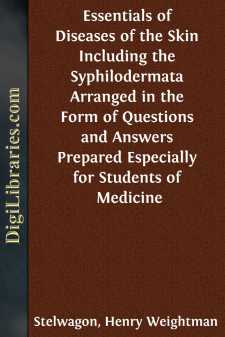Non-Classifiable
- Non-Classifiable 1768
Non-Classifiable Books
Sort by:
The symptoms of cutaneous disease may be objective, subjective or both; and in some diseases, also, there may be systemic disturbance. What do you mean by objective symptoms? Those symptoms visible to the eye or touch. What do you understand by subjective symptoms? Those which relate to sensation, such as itching, tingling, burning, pain, tenderness, heat, anæsthesia, and hyperæsthesia. What do you...
more...
CHAPTER I IntroductionDEFINITIONThe word "conducting" as used in a musical sense now ordinarily refers to the activities of an orchestra or chorus leader who stands before a group of performers and gives his entire time and effort to directing their playing or singing, to the end that a musically effective ensemble performance may result. This is accomplished by means of certain conventional...
more...
by:
Alexander Philip
TIME AND PERIODICITY We can measure Time in one way only—by counting repeated motions. Apart from the operation of the physical Law of Periodicity we should have no natural measures of Time. If that statement be true it follows that apart from the operation of this law we could not attain to any knowledge of Time. Perhaps this latter proposition may not at first be readily granted. Few, probably,...
more...
AUTHOR'S PREFACE Contemporary psychology has studied the purely reproductive imagination with great eagerness and success. The works on the different image-groups—visual, auditory, tactile, motor—are known to everyone, and form a collection of inquiries solidly based on subjective and objective observation, on pathological facts and laboratory experiments. The study of the creative or...
more...
STATEMENT OF HON. RICHARD BARTHOLDT,A REPRESENTATIVE IN CONGRESS FROM THE STATE OF MISSOURI. Mr. Bartholdt. Mr. Chairman and gentlemen, I do not wish to occupy your time, for the reason that I can be here almost any time, while Prof. Christen has made a special trip from New York for this purpose, and I should like to give him all the time you can afford to devote to this bill. I merely wish to say, in...
more...
by:
William W. Mann
THE ESPERANTO ALPHABET(WITH PHONETIC PRONUNCIATION). The Esperanto Alphabet has 28 letters—23 consonants, 5 vowels:—A, a(ah) likeainfatherorpa; aspatro(pah'troh). In unaccented syllables it should not be dwelt upon, and in all cases it should be pronounced quite purely, without the slight drawlingr-sound which is sometimes added to the corresponding vowel in EnglishahB, b(bo) as in EnglishbC,...
more...
CHAPTER I. LEAVING THE CASTLE. Olendorf is not far from Hamburg. The broad and sparkling Elbe washes it on the western side, and with the rugged mountains and the weird grand, old forests upon the north and east, seem to shut the little town quite in from the outer world; yet Olendorf had been an important place and on account of its grand old fortress, Castle Wernier, was a bone of contention...
more...
EPILEPSY, HYSTERIA, AND NEURASTHENIA CHAPTER I MAJOR AND MINOR EPILEPSY (Grand and Petit Mal) "My son is sore vexed, for ofttimes he falleth into the fire, and ofttimes into the water."—Matthew xvii, 15. "Oft, too, some wretch before our startled sight, Struck as with lightning with some keen disease, Drops sudden: By the dread attack o'erpowered He foams, he groans, he trembles, and...
more...
by:
Walter Fox Allen
Foreword. Realizing the tremendous interest that is now being directed by owners of country estates everywhere to the culture of the Persian or English Walnut, I have compiled this little book with the idea of supplying the instruction needed on the planting, cultivation and harvesting of this most delicious of all nuts. I have gathered the material herein presented from a large number of trustworthy...
more...
by:
Alfred Ainger
CHAPTER IEARLY LIFE IN ALDEBURGH(1754-1780)Two eminent English poets who must be reckoned moderns though each produced characteristic verse before the end of the eighteenth century, George Crabbe and William Wordsworth, have shared the common fate of those writers who, possessing a very moderate power of self-criticism, are apparently unable to discriminate between their good work and their bad. Both...
more...











